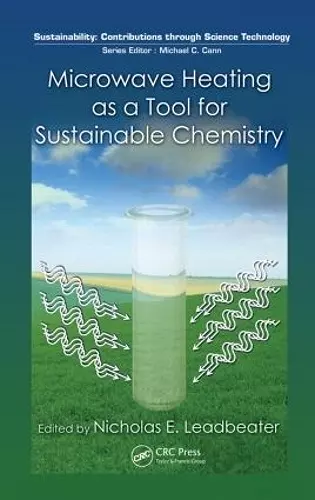Microwave Heating as a Tool for Sustainable Chemistry
Format:Hardback
Publisher:Taylor & Francis Inc
Published:2nd Sep '10
Currently unavailable, and unfortunately no date known when it will be back
This hardback is available in another edition too:
- Paperback£74.99(9781138111981)

Shorter reaction times, higher product yields, and enhanced selectivity are some of the advantages microwave heating has over conventional methods, causing its use to transition from a curiosity to mainstream, both in industrial and academic settings. Microwave Heating as a Tool for Sustainable Chemistry showcases the application of microwave heating in a number of areas of preparative chemistry as well as in the biosciences.
From organic chemistry to materials and biological applications
The book begins with an introduction to microwave heating, the physical concepts behind it, its application in synthetic chemistry, and commercially available microwave equipment. It shows how microwave heating can be used to facilitate the clean and sustainable synthesis of organic compounds. The authors examine microwave heating as a tool for sustainable polymer chemistry, with discussions of the use of alternative solvents and feedstocks, the design of degradable polymeric materials, and recycling polymers. They then discuss the significant contribution made by microwave-promoted synthesis in the drug discovery process, with a focus on how the technology has been used to generate discovery chemistry libraries and as a tool for medicinal chemists. Other topics examined in this application-driven text include the use of microwave heating in the preparation of inorganic and organometallic compounds, in the production of inorganic materials, and in the area of biosciences.
Academic and industrial settings
The book examines the scale-up of microwave-promoted chemistry and describes the various approaches and the current commercially available microwave reactors available for scale-up. It also discusses microwave heating as a tool for teaching in the undergraduate organic chemistry laboratory. It explores curriculum, the broad range of reactions that can be performed, and the incorporation of green chemistry principles.
The author maintains a website with supplemental information.
"Overall this book covers many areas which utilise microwave heating technology to enhance one or many aspects of chemical transformations. The text is best suited to postgraduate students and academics with an interest in synthetic methodology and serves as an excellent starting point to flesh out ideas potentially applicable to microwave irradiation. Well worth a read and an excellent addition to any professional library."
—Luke C Henderson, Reviews, July 2011, No. 22, Vol 12
… valuable for process chemists and should be read by all those thinking about scaling up a microwave reaction or purchasing equipment.
— Trevor Laird, Editor, Organic Process Research & Development
This book is a useful complement to literature reviews and other books on the topic. For those who are interested in green and sustainable chemistry, it is well worth reading.
—Wei Zhang, University of Massachusetts, Boston, in Journal of the American Chemical Society
"Overall this book covers many areas which utilise microwave heating technology to enhance one or many aspects of chemical transformations. The text is best suited to postgraduate students and academics with an interest in synthetic methodology and serves as an excellent starting point to flesh out ideas potentially applicable to microwave irradiation. Well worth a read and an excellent addition to any professional library."
—Luke C Henderson, Reviews, July 2011, No. 22, Vol 12
… valuable for process chemists and should be read by all those thinking about scaling up a microwave reaction or purchasing equipment.
— Trevor Laird, Editor, Organic Process Research & Development
This book is a useful complement to literature reviews and other books on the topic. For those who are interested in green and sustainable chemistry, it is well worth reading.
—Wei Zhang, University of Massachusetts, Boston, in Journal of the American Chemical Society
ISBN: 9781439812693
Dimensions: unknown
Weight: 710g
290 pages